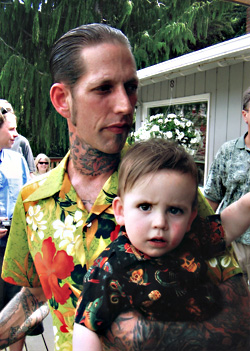Early in September, the tight-knit community surrounding David “Slim” McCarroll coordinated a series of fund-raisers for their friend, who had been diagnosed with Graves’ disease, a dangerous autoimmune disorder that affects the thyroid. Slim’s circle of supporters was broad and deep, thanks to his role as frontman for Seattle punk bands Los Hornets and the Vaccines, and his involvement in the notoriously rowdy but good-natured skateboard alliance the Jaks. Former Fallout Records owner Tim Hayes DJ’d a raffle at Hattie’s Hat, local band the F-Holes played a benefit at the Comet, and the good men over at Anchor Tattoo put together “Hearts for Slim,” an all-day, needle-powered marathon during which the proceeds from all heart tattoos inked in Slim’s honor were passed along to Clare-a-bell McCarroll, Slim’s wife of 11 years and the mother of his two young sons. All the events were well-attended, and as so often happens when something uncontrollable threatens a member of the music community, the drive to “take care of our own” was evident and heartwarming.
Slim was receiving medical treatment and seemed to be doing better on his 41st birthday, which he celebrated in low-key fashion with his family and friends on Sept. 25. However, suddenly and tragically, complications set in, and he died unexpectedly at home on Thursday, Sept. 27.
In a heartbreaking statement released via her MySpace page, Clare-a-bell described her late husband as “the love of my life, the best father a kid could wish for, a kickass frontman, and a very proud Jak. I will always be honored to have been his girl.” When speaking with those close to Slim and his family, it’s painfully clear that his death is gut-wrenching not only because of the loss of a good man, but because of the children and wife he left behind. “Never have I seen a deeper love than the one she and Slim shared,” says local DJ and music community activist Kerri Harrop. “They were each other’s one and only, and his death is a tragedy on so many levels.”
Local musician Jason Freeman, who currently plays bass with Zeke and previously was in the Kent 3, helped found Los Hornets with Slim back in the mid-’90s when the two friends worked at Piecora’s Pizza on Capitol Hill. (The pair also later went on to form the Vaccines.) “He couldn’t sing and he was rhythmically challenged, but he was probably one of the best frontmen ever,” recalls Freeman. “He was a spastic jolt of energy,” says former Los Hornets guitarist Jethro Odom. “A wiry frame swinging a washboard or maracas around, spitting out lyrics about drinkin’, cars, and girls in the finest of punk-rock traditions.”
“He was both fearless and compassionate,” adds Freeman. “And I really admired that about him.”
Sadly, as one might expect, bare-bones Medicaid insurance is only covering a portion of his family’s financial burden, so fund-raising efforts continue. Individual donations can be made via PayPal to the address slimbotex@yahoo.com. Freeman has also coordinated a benefit this Saturday, Oct. 20, at Neumo’s, with a temporarily reunited Kent 3 and the RC5. On Nov. 16, Mudhoney and Zeke will also contribute to the cause at El Corazon.
A public memorial for Slim will be held at 5 p.m. on Friday, Oct. 26, at the Golden Gardens Bathhouse (8498 Seaview Ave. N.W.) in Ballard.
This seems as good a time as any to remind everyone that even though working musicians often feel adrift and helpless when it comes to both preventative and emergency health care, there are excellent, accessible resources out there that really can help artists in need. “The best place they can turn is MusiCares,” says Ben London, executive director of the Pacific Northwest Chapter of the Recording Academy (and a veteran local musician himself). “MusiCares helps with a variety of health and human service issues, from the life threatening to the mundane—all those things that can have a negative impact on musicians’ lives. It is completely confidential.” MusiCares is a program of the Grammy Foundation, funded through the Recording Academy, but musicians do not need to be a member to receive assistance, nor do they need to derive 100 percent of their income from music to get help. “They’ve helped more people than you’d think,” says London.
For more information, call the help line at 1-800-687-4227 or visit www.grammy.com/musicares/client_services.








